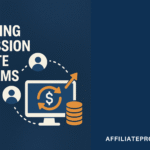Welcome to my article “Ethics in Affiliate Marketing: Building Trust and Credibility”.
In today’s fast-growing world of affiliate marketing, where every click can turn into cash, one thing that marketers shouldn’t ignore is ethics. It can be tempting to focus only on numbers, chasing clicks and sharing affiliate links everywhere, but doing this without honesty? That’s a quick way to lose your audience’s trust – and maybe get a warning from the FTC (the people who make sure marketing is fair).
Whether you’re an experienced affiliate marketer or just starting, following ethical practices is essential. It not only makes your audience happy and loyal, but it also strengthens your brand and can lead to better, long-term partnerships. In this blog, we’ll discuss why ethics are so important in affiliate marketing, practical steps to be more transparent, and how honesty can make you the kind of marketer people want to follow. And if this sounds too good to be true, well… maybe we’re just being a little optimistic about ethics!
My Best Recommended & Proven Way to Make $100-$300 Daily – Watch This FREE Video to START >>>

Why Ethics Matter in Affiliate Marketing
In affiliate marketing, where you earn commissions by promoting products or services, ethics play a big role. Why? Because people don’t just buy products anymore; they buy trust. When you recommend a product to your audience, they’re trusting your word, and this trust is a huge responsibility. Being ethical in your recommendations is what sets successful affiliate marketers apart from the ones who are here today, gone tomorrow.
Imagine this: you tell your followers about a product, saying it’s the best thing ever. They buy it, but it turns out to be disappointing. They’ll feel cheated – and worse, they’ll feel that you cheated them. In a world where your word matters, ethics in affiliate marketing mean you’re not just chasing sales, but actually helping people make good choices. This not only builds trust but also loyalty. When followers know that you only recommend things you believe in, they’re more likely to come back for your advice in the future.
Ethics also keep you safe from trouble with regulations. For example, the FTC requires affiliate marketers to disclose their partnerships honestly. It’s a simple rule but following it is important, as failing to disclose an affiliate link can lead to fines and harm your reputation. So, by being transparent about partnerships and honest about the products, you’re not only building trust with your audience but also staying on the right side of the law.
At the end of the day, ethics in affiliate marketing are about playing fair and thinking long-term. Instead of just aiming for quick sales, ethical marketers focus on creating lasting relationships with their audience. And in a field that’s all about influence, those who stick to ethical practices build a name that people remember – and respect.
Transparency in Affiliate Marketing
Transparency is like the backbone of affiliate marketing. It simply means being open and honest with your audience about any partnerships or commissions you earn from the products you promote. Now, you might wonder, “Does it really matter if I mention that I’ll earn a small amount if they buy through my link?” The answer is a big yes! Transparency builds trust – and in affiliate marketing, trust is everything.
When you disclose that a link is an affiliate link, it shows that you respect your audience’s right to know. Imagine if a friend recommended you a product, and later you found out they were getting paid for it without telling you. Wouldn’t you feel a bit betrayed? In the same way, when followers know upfront that you earn a commission, they’ll respect you more. It tells them that you have nothing to hide and that you value their trust more than a few extra sales.
My Best Recommended & Proven Way to Make $100-$300 Daily – Watch This FREE Video to START >>>
Following transparency is also a legal requirement. The FTC (Federal Trade Commission) in the US, for example, requires that all affiliate links be disclosed, so your audience knows they’re clicking on a paid link. While this rule is mostly for the US, similar guidelines apply in other countries as well, and it’s just good practice to be clear no matter where you’re from. A simple phrase like “This is an affiliate link, and I may earn a small commission if you buy” can keep things honest, build your credibility, and show that you’re a responsible marketer.
Transparency also makes your audience feel more confident in your recommendations. When they know you’re open about partnerships, they trust that you’re not just promoting something for profit – they’ll feel that you genuinely like the product. And that’s what keeps people coming back for your honest advice. After all, in a world where everyone is selling something, people appreciate a marketer who’s upfront and real with them.
Promoting Products Honestly and Authentically
When it comes to affiliate marketing, honesty and authenticity are what make people trust you. It’s easy to say a product is “the best ever” or “life-changing,” but if you don’t genuinely believe in it, your audience will eventually see through it. Promoting products honestly and authentically means sharing your true opinion, showing both the good and the bad, and being real with your audience. After all, your followers are smart – they can sense when someone is just pushing a sale versus when they’re truly excited about something.
Let’s say you’re promoting a smartphone. Instead of only listing out fancy features, talk about how it actually performs. Share your experience – what you liked, any limitations, and who it would be best for. If the phone’s camera isn’t as good as claimed or the battery doesn’t last as long as expected, it’s okay to mention that. When you’re honest, people feel like they’re getting real, valuable advice, not just a sales pitch. Plus, if they end up buying it and feel you gave them the whole picture, they’ll trust you even more.
Another important part of authenticity is only promoting products you’d use yourself or recommend to close friends and family. Many marketers fall into the trap of promoting anything that pays, but this can backfire. When you stand behind what you recommend, your audience feels that connection. They see that you’re not just here to make a quick buck – you’re here to actually help them. And when people feel that you genuinely care, they’re far more likely to follow your advice.
Honest and authentic promotion may not bring quick, high sales, but it builds something much more valuable – a loyal and trusting audience. In affiliate marketing, this loyalty can make a huge difference. Instead of seeing you as “just another seller,” people will view you as someone who actually looks out for them. And in a world full of ads and promotions, that’s rare and powerful.
Respecting Audience Privacy and Data
In today’s digital world, privacy is a big deal. People are more aware than ever about how their data is collected and used. For affiliate marketers, respecting audience privacy isn’t just good manners – it’s necessary. When you show that you value and protect your audience’s privacy, it builds trust and helps your followers feel safe and respected on your platform.
Now, what does respecting privacy mean in affiliate marketing? First, if you’re using tracking tools (like cookies) to collect data on user activity, it’s important to let your audience know. Cookies are small pieces of data that help marketers see how many people clicked on a link or bought a product after visiting their website. While this is helpful for tracking sales, it’s good practice to inform your visitors that you’re using them. A simple note saying, “This site uses cookies to improve your experience,” is enough to keep things clear and honest.
My Best Recommended & Proven Way to Make $100-$300 Daily – Watch This FREE Video to START >>>
Privacy also means not collecting unnecessary data or asking for more information than you really need. For example, if you’re running a giveaway or promotion, only ask for details that are essential, like a name and email. Avoid requesting personal information that isn’t required. This shows your audience that you respect their privacy and won’t misuse their data.
It’s also important to follow data privacy laws, like GDPR (General Data Protection Regulation) for European users and CCPA (California Consumer Privacy Act) for California users. Even if these laws don’t apply everywhere, it’s wise to follow them as a way to respect your audience’s privacy no matter where they’re from. Let people know they can opt out of data tracking or unsubscribe from emails anytime. Being open about this makes people feel more secure and shows you care about their comfort on your platform.
When you respect privacy and handle data carefully, it sends a powerful message to your audience: you value them as people, not just as numbers. In affiliate marketing, building this trust and showing genuine care will keep followers coming back, and they’ll know that with you, their data is safe and respected.
Selecting Quality Products and Reputable Partners
In the world of affiliate marketing, the products you choose to promote can make or break your reputation. This is why selecting quality products and reputable partners is so important. When you align yourself with brands and products that you truly believe in, you not only protect your own credibility, but you also provide real value to your audience. After all, nobody wants to recommend something that doesn’t work well or is of poor quality.
So, how do you pick the right products? Start by doing your homework. Research the product thoroughly. Look for reviews, both from customers and industry experts. Check if the product delivers what it promises and if it has a good track record. If you find mixed reviews or complaints about the product, it might be best to steer clear. Remember, when you recommend a product, you’re putting your reputation on the line. You want your audience to have a positive experience, so always choose items that have a good reputation.
Next, it’s essential to choose partners who are known for their reliability and ethical practices. Look for brands that are transparent about their business practices, such as how they source their products and how they treat their customers. It’s a bonus if the brand shares your values, whether it’s sustainability, fair trade, or excellent customer service. When you promote products from reputable partners, it enhances your own credibility. Your audience will feel more confident buying from brands you recommend because they trust your judgment.
It’s also a good idea to try out the products yourself whenever possible. This way, you can speak from personal experience and provide genuine feedback. If a product isn’t up to par, don’t be afraid to say so. Your honesty will build trust with your audience. They’ll appreciate that you’re not just pushing any product for a quick commission; you’re genuinely looking out for their best interests.
Lastly, always keep your audience in mind. Think about their needs and preferences when selecting products. Promoting items that resonate with your audience will not only lead to higher conversion rates but also strengthen your relationship with them. When your followers see that you care about providing them with quality recommendations, they’ll be more likely to trust you and keep coming back for more advice. In the end, selecting quality products and reputable partners is all about building a trustworthy brand that people can rely on.
Conclusion
As we wrap up our discussion on ethics in affiliate marketing, it’s clear that following ethical practices is not just a nice-to-have; it’s a must for anyone who wants to succeed in this field. When you focus on honesty, transparency, and respect for your audience, you’re building a strong foundation of trust. This trust is what keeps your audience coming back for your advice, making them feel confident in your recommendations.
Promoting products honestly and authentically shows that you care about your audience and their needs. When you choose quality products and reputable partners, you not only protect your own reputation but also ensure that your followers have a positive experience. And by respecting their privacy and data, you’re sending a powerful message that you value them as individuals, not just as potential sales.
In a world where many people are just trying to sell something, being an ethical affiliate marketer sets you apart. It turns your marketing efforts into a meaningful relationship with your audience. They will appreciate your genuine approach and are likely to trust your recommendations even more. This trust can lead to long-term loyalty, higher engagement, and ultimately better results for your affiliate marketing efforts.
My Best Recommended & Proven Way to Make $100-$300 Daily – Watch This FREE Video to START >>>
So, whether you’re just starting out or you’re a seasoned marketer, remember that ethics matter. They are the key to building a credible and respected brand in the affiliate marketing space. By prioritizing ethics, you’re not only doing the right thing, but you’re also paving the way for a more successful and fulfilling affiliate marketing journey. After all, in the end, it’s all about creating a win-win situation for you and your audience. So, let’s keep it real, stay ethical, and watch our community grow!
Thank you for reading my article “Ethics in Affiliate Marketing: Building Trust and Credibility” till the end. Hope it helped you. See you with another article.










